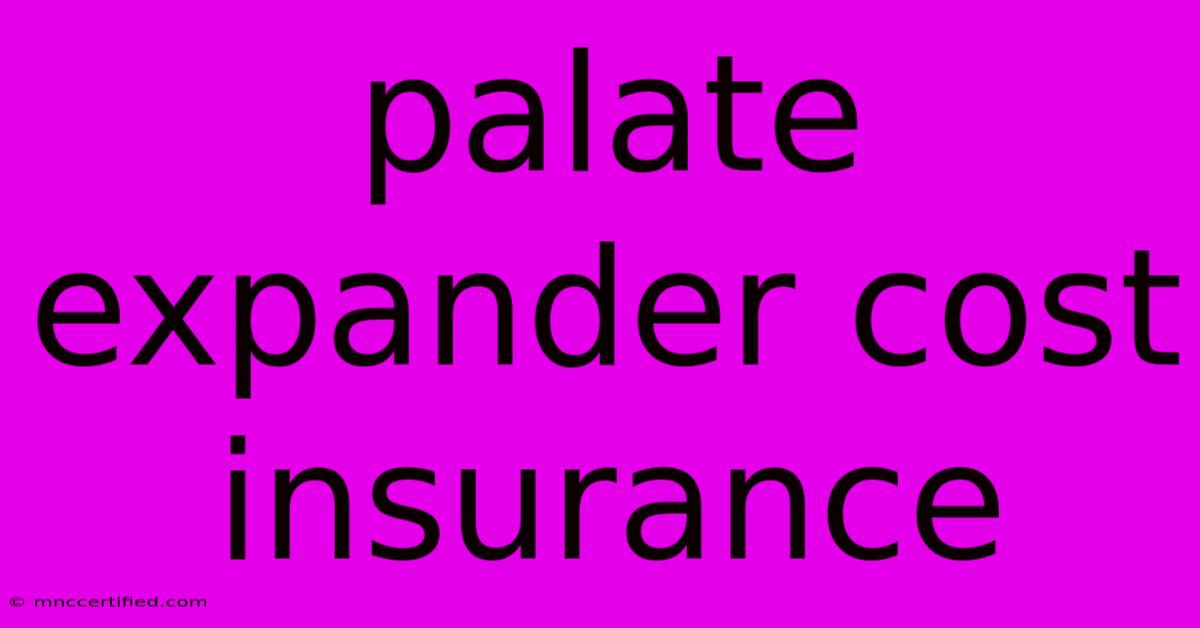Palate Expander Cost Insurance

Table of Contents
Palate Expander Cost: What Insurance Covers & How to Reduce Expenses
Expanding your palate, also known as palatal expansion, is an orthodontic procedure used to widen the upper jaw. This can be necessary to correct overcrowding, improve breathing, or address other dental issues. However, the cost of a palate expander can be a significant concern for many families. This article will explore the typical costs associated with palate expanders, what your insurance might cover, and strategies to minimize expenses.
Understanding the Cost of Palate Expanders
The price of a palate expander varies significantly depending on several factors:
- Type of expander: Different types of expanders exist, ranging from simple, removable appliances to more complex, surgically-placed devices. The complexity directly impacts the cost.
- Orthodontist's fees: Orthodontists' fees vary based on their experience, location, and practice overhead. Expect significant regional differences in pricing.
- Additional procedures: Sometimes, palate expansion requires additional procedures, such as extractions or other orthodontic work, which will increase the overall cost.
- Length of treatment: Treatment time can vary, impacting the overall expense. Longer treatment times naturally translate to higher costs.
Expect to pay anywhere from $1,000 to $5,000 or more for a palate expander and related treatment. This is just an estimate; always get a detailed quote from your orthodontist.
Insurance Coverage for Palate Expanders
Many dental insurance plans cover at least a portion of orthodontic treatment, including palate expanders. However, coverage can be highly variable. Here's what you need to know:
- Check your policy: Carefully review your insurance policy's specifics regarding orthodontic benefits. Look for details on annual maximums, percentage coverage, and any exclusions.
- Pre-authorization: Most insurance companies require pre-authorization before starting orthodontic treatment. This is crucial to ensure coverage and avoid unexpected out-of-pocket costs. Contact your insurance provider before your initial consultation.
- Coverage limitations: Some plans only cover a certain percentage of the total cost, often leaving a substantial portion for the patient to pay. Others may have limitations on the types of expanders covered.
- Orthodontic vs. Medical necessity: Insurance companies are more likely to cover medically necessary procedures. If the palate expander is deemed medically necessary (e.g., to correct severe breathing problems), your chances of receiving greater coverage increase.
Negotiating with Your Insurance Provider
Don't hesitate to contact your insurance provider to clarify coverage details. Ask specific questions about:
- Covered procedures: What specific aspects of palate expansion are covered?
- Payment schedule: Will payments be made directly to the orthodontist, or will you receive reimbursement?
- Appealing denials: Understand the process for appealing a denied claim if necessary.
Reducing the Cost of Palate Expansion
Even with insurance, the out-of-pocket expense can be significant. Here are some ways to potentially reduce costs:
- Payment plans: Most orthodontists offer payment plans to help manage the financial burden. Discuss various options available.
- Dental savings plans: Consider joining a dental savings plan that can provide discounts on orthodontic services.
- Inquire about discounts: Ask your orthodontist about any potential discounts for cash payment or prompt payment.
- Shop around: Obtain quotes from several orthodontists in your area to compare pricing and services.
- Consider alternative treatment options: In some cases, less expensive alternatives may be available, depending on the specific needs of the patient. Discuss these with your orthodontist.
Conclusion: Planning for Palate Expander Costs
The cost of a palate expander can be substantial. Thorough planning is essential. Start by understanding your insurance coverage, exploring payment options, and comparing quotes from different orthodontists. By taking proactive steps, you can better manage the financial aspects of this important treatment. Remember to always communicate openly with your orthodontist and insurance provider to ensure a smooth and financially manageable process.

Thank you for visiting our website wich cover about Palate Expander Cost Insurance. We hope the information provided has been useful to you. Feel free to contact us if you have any questions or need further assistance. See you next time and dont miss to bookmark.
Featured Posts
-
Davis And Davis Insurance Agency
Nov 27, 2024
-
Sebanda Insurance Phone Number
Nov 27, 2024
-
Tom Storm Insurance Agency Inc
Nov 27, 2024
-
U21s Match Report 1 2 Defeat For Sunderland
Nov 27, 2024
-
Uk Diplomat Expelled Russias Accusation
Nov 27, 2024